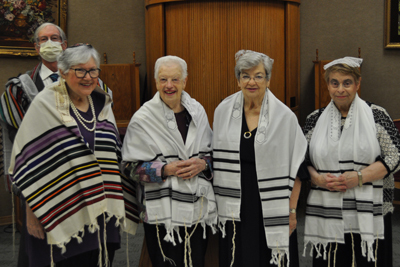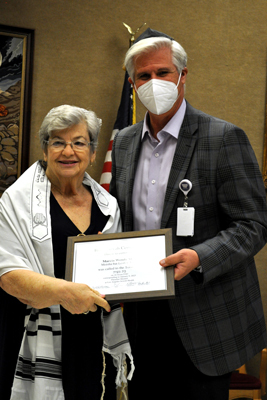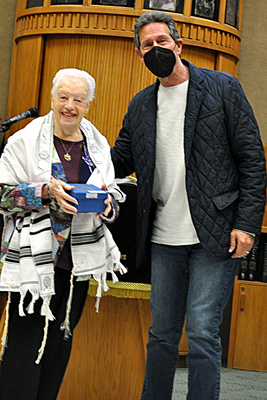At Los Angeles Jewish Health, B'not Mitzvah to Remember


At Los Angeles Jewish Health, B'not Mitzvah to Remember

The great dramatist and author George Bernard Shaw famously declared that "Youth is wasted on the young." But Shaw clearly never met the residents of Los Angeles Jewish Health, whose incredible energy, dynamism, and desire to learn prove it's always a good time to engage in a journey of self-discovery.
Last month, four Los Angeles Jewish Health residents celebrated their b'not mitzvah. In a ceremony typically celebrated by 12 or 13 year olds, the 4 women stood in front of their community at Eisenberg Village to read from the Torah and offer their interpretations of its text, in the process honoring the faith of their forebearers and affirming their commitment to Jewish peoplehood.
For Casey Joseph, Judith Karon, Marcia Mass and Sue Solender, deciding to study for an adult bat mitzvah required a leap of faith on multiple levels.
"Whether you're a teenager or a woman somewhat past that, it takes a lot of courage to stand up in front of family and friends and chant words in an unfamiliar language, becoming links in a chain that extends all the way back to Mt. Sinai," says Rabbi Ron Goldberg, rabbi of Los Angeles Jewish Health's Eisenberg Village campus. "I am just thrilled for these women, whose determination and hard work were on display for everyone to see."
Rabbi Goldberg officiated at the ceremony, the outgrowth of an adult b'nai mitzvah program he put together with Chief Mission Officer for Los Angeles Jewish Health Rabbi Karen Bender. He says most female residents of Los Angeles Jewish Health never had the opportunity to read from the Torah as young adults—and that he and Rabbi Bender are thrilled to help them engage with Jewish liturgy and tradition.
"Today our female residents—who as girls may have been denied a chance to do what their male counterparts were doing—get to stand up and speak for themselves," Rabbi Goldberg says.

Making her own decisions about what she could do was particularly important to
Casey Joseph, 69, a native of Pittsburgh who moved to Los Angeles with her family
when she was 11. "I was always interested in learning about Judaism, but I was always
told ‘no' because it was something reserved for boys," she says. "I never stopped
thinking about it and knew it would be important for me to do at some point. Being
at Los Angeles Jewish Health, I realized now was my moment, and I reached out and
grabbed it."
Sue Solender, 80, felt similarly. "When I was in grade school, the Jewish community in my hometown of Minneapolis built a Hebrew school, and I wanted to go, but my mother told me I couldn't," she says. "So, I waited and waited, and once I arrived at Los Angeles Jewish Health, I decided that, if they ever had an adult bat mitzvah study group, that would be a sign."
For Marcia Mass, 81, the bat mitzvah was a chance to connect with her roots. "My parents moved out to Los Angeles to get away from the orthodoxy of my father's family, so they were not religious, and we never did anything special to mark the holidays," she recalls. "When I had my own daughters, I decided it was important for them to be raised as Jews and to learn about their culture, and both of them had bat mitzvahs."
Yet, Marcia never fully explored her own Judaism, and Los Angeles Jewish Health opened her up to the possibility. "I studied hard, and I'm so thrilled it came together and that I was able to share it with three other strong women," she says. "It was a marvelous experience."

This was the second adult bat mitzvah for Judith Karon, 83. In 1995, she studied with her rabbi in Duluth, Minnesota, and took advantage of the bat mitzvah event as an occasion to have a family reunion. "People came from all over the country, and I did the whole thing: Torah reading, haftorah, big party with music. It was special. But this time, at Los Angeles Jewish Health, it was much more spiritually significant to me," Judith says.
"Part of what was so wonderful was that the four of us developed a closeness as we learned and prepared together," she continues. "Also, when I got up in front of the congregation, I saw the place was packed, and I was just blown away. All of our friends were there, and our fellow residents, and the staff, and even the chairman of the board of directors and the CEO."
During the ceremony, Los Angeles Jewish Health CEO and President Dale Surowitz presented the b'not mitzvah with Kiddush cups; Andrew Berman, chairman of Los Angeles Jewish Health's board, handed out commemorative certificates to mark the occasion. Their presence was just one of the many things that made the warmth and excitement in the room that day palpable, Judith says. "There was just this incredible sense of community. You really had to be there to experience it!"